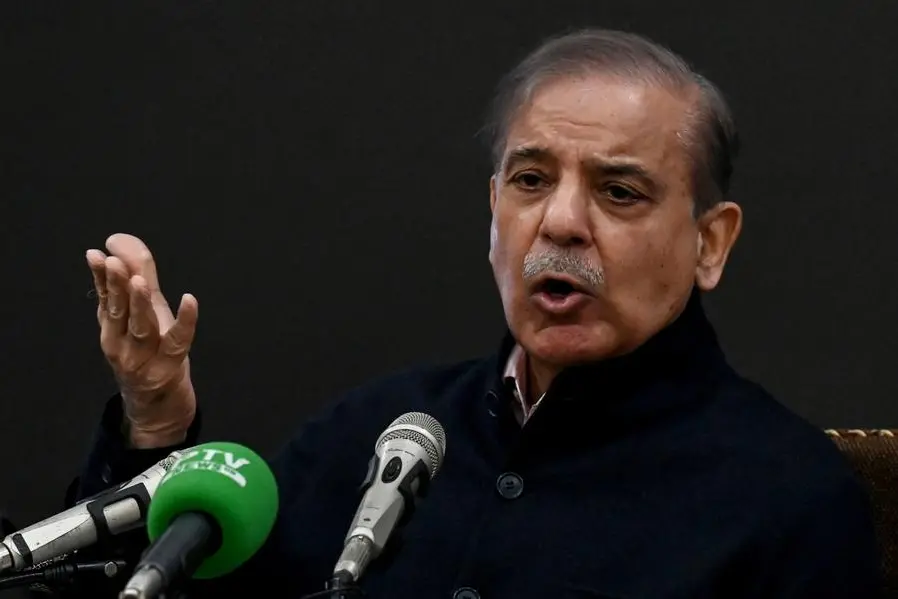PHOTO
Shehbaz Sharif, set to be named Pakistan's prime minister for a second time on Sunday, has stepped to the fore as a compromise candidate suited to turbulent times.
The 72-year-old is due to be voted in by lawmakers as the head of a shaky coalition, shutting out loyalists of jailed former prime minister Imran Khan, after February 8 polls returned no clear winner.
Shehbaz is the younger brother of three-time prime minister Nawaz Sharif, considered the stronger personality and more charismatic of the pair.
Shehbaz first served as prime minister in 2022, heading a similar broad alliance of parties that combined to boot Khan from power.
A seasoned administrator with a reputation stemming from his nuts-and-bolts work in provincial politics, Shehbaz is known for having a penchant for poetry.
The Sharif family's military-backed Pakistan Muslim League-Nawaz (PML-N) party won the most seats in the election, but fell short of an expected majority in a poll that was marred by allegations of pre-poll rigging and vote tampering.
Khan's lawmakers won the most seats, despite a sweeping crackdown against his Pakistan Tehreek-e-Insaf party that forced its candidates to run as independents and blocked them from holding rallies.
But Khan's faction fell short of the majority needed to rule and are set to sit in full-throated opposition, leaving Sharif to steer a shaky coalition including PML-N's historic rivals Pakistan Peoples Party.
While keeping the coalition intact and fending off Khan's unquashed defiance, the new prime minister must also grapple with a grinding economic downturn and a worsening security situation.
- Choice between brothers -
Political heavyweight and three-time prime minister Nawaz was PML-N's top candidate when they anticipated better results in last month's vote.
Analysts say Shehbaz has been swapped in to steer the coalition because of his reputation as a deal-maker, but that Nawaz -- dubbed the "PML-N Supremo" by domestic media -- will still call the shots.
Shehbaz jointly inherited the family's steel business as a young man and was first elected to provincial office in 1988. For years he served as chief minister of Punjab province, his family's power base.
During his tenure, he presided over a series of big-ticket infrastructure projects, including Pakistan's first metro bus service.
Officials were reportedly kept on their toes by workaholic Sharif's habit of surprise visits to government offices, which he would inspect clad in a favoured safari suit and hat.
Still, critics say he did little to address the province's core issues -- including the need for civil service, health and agricultural reforms.
Instead, they say, he focussed on vote-grabbing boondoggles, such as distributing laptops to students or offering subsidised taxis to the jobless.
Sharif has also been linked to graft and corruption -- charges supporters say sprang from a political vendetta by Khan.
In December 2019, the National Accountability Bureau seized nearly two dozen properties belonging to Sharif and his son Hamza, accusing them of money laundering.
He was arrested and detained in September 2020, but released around six months later on bail and was acquitted after he came to power the first time.
- 'Effective coordination' -
Sharif's first tenure was defined by a steep economic downturn and a campaign of defiance from popular Khan -- who was jailed and barred from office in the runup to polls.
The premiership lasted less than a year and a half before he handed the reins to a caretaker government which ushered in elections last month.
Unlike his elder brother -- whose relations with the country's powerful military and his opponents were strained -- Sharif was considered capable of compromising even with his enemies.
Pakistan's military is the country's most powerful institution and has ruled the nation for nearly half its history -- and pulls the strings even when not actually governing.
"I have always remained a strong supporter of effective coordination between Islamabad and Rawalpindi," Sharif said, referring to the administrative capital and the nearby military headquarters.
Sharif remains popular, particularly in Punjab, despite lurid tabloid headlines about multiple marriages and a property portfolio that includes luxury apartments in London and Dubai.





















